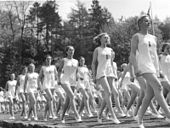I spent fifteen years telling myself I couldn’t do something. Which was stupid, because that always turns out to be true. To be accurate I spent thirteen years doing that and another two years thinking I had to do it but I didn’t know how. Then a year seriously thinking about how I was going to do it.
It was a story. The problem was it was true. The bigger problem was it happened in a Germany that has thankfully disappeared, which I knew next to nothing about. Not least as I didn’t speak German.
https://youtu.be/E7IVGBWV8cc
I didn’t want to be the sad bloke with shelves full of books with swastikas on the spine. Even after I learned they’re called hakencruzen. I read everything I could, buying books from boot-sales, second-hand shops, anywhere. What I didn’t want was military history. I needed to know how a village worked. What people had for breakfast in 1945. What the newspaper was called.
I had the story: I’d heard it first-hand. I needed the framework it happened in. And the reality of that wasn’t anything you’ve ever seen on TV. You think you know about it from the graphic violence of Saving Private Ryan or the extended buddy movie treatment of Band of Brothers. You don’t. Even Der Untergang doesn’t touch on what happened to ordinary people, the millions of people who just happened to be born at a place, at a time. Who could have been anybody. Who could have been you.
I hadn’t the first clue before I started this what had happened to ordinary people. I got my first clue talking to a German woman about her town. I’d asked her what’s it like?
Oh, quite new houses, like any other town in the north of Germany, she’d said. And the old town? Well, the RAF took care of the old town one night in late March 1945. Chiefly because they could. It shocked me. It still does. And before anyone jumps up and down screaming about the Blitz, yes. Awful. About 40,000 British people died from German bombing in the war. About 40,000 people died in three nights of bombing by the RAF in Hamburg. Something else they forgot to mention at my school, along with the whole idea of German resistance to Nazism which by its nature, was quite secretive and predictably and inevitably short-lived. It must have been exactly the same as in places like Syria now. “Why didn’t you fight it?” always comes up against “How?”
It must have been exactly the same as in places like Syria now. “Why didn’t you fight it?” always comes up against “How?” When the police take away everyone in the house next door, what are you going to do? Call the police? Maybe write to your MP? Fight them, the same way refugees are told they should, with sticks against rifles? And there’s always plenty more room on the truck. But some people stood up.
I turned it into a screenplay, Janni Schenk. One person refused to read it twice because it upset her so much the first time. It’s not graphic violence. The body count is very low and almost all of it happens out of shot. It’s a very simple story. Almost all of it is true.
An orphaned boy is betrayed by his country, his youth-group and his school-teacher before he saves his village from total destruction.
Except his youth-group was the Hitler Jugend. And the people about to destroy his village were the US Army. And for that reason alone I don’t think any film-maker outside Germany is going to touch it with gloves on. Certainly not an American film-maker. But let’s see. Maybe I’ll be wrong.




